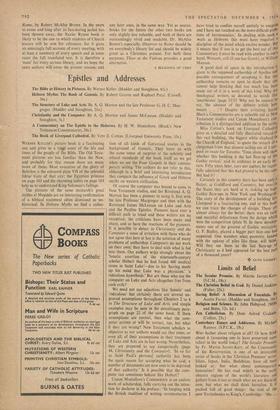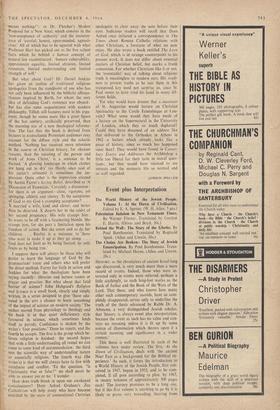Limits of Belief
The Secular Promise. By Martin Jarrett-Kea' (S.C.M., 18s.)
The Christian Belief in God. By Daniel Jenkins, (Faber, 25s.)
Saving Belief: A Discussion of Essentials. BY and Boon, 12s. 6d.) Zen Catholicism. By Dom Aelred Graharn. (Collins, 25s.)
WHY bother about religion at all? Or how think about it (assuming one to have preserved some relics) in the world today? The Secular Promise, by Fr. Martin Jarrett-Kerr, of the CommurntY of the Resurrection, is one of an interesting series of books in the 'Christian Presence' series, Islam, Japan, India, Buddhism, have all been looked at: but what about contemporad humanism? He has read widely in the more obscure regions of the world's literature and gathers from it not so much what we are thinking now, but what we shall think hereafter. It Is packed full of good things: the visit of the poet Yevtushenko to King's, Cambridge--`Me
means nothing!': or Dr. Fletcher's Modest Proposal for a New Sinai, which consists in the `non-acceptance of authority' and the mainten- ance of 'careful, honest, open-minded, agnosti- cism.' All of which has to be squared with what Professor Hart has picked out as the five salient facts which lie behind a human concept of natural law reconstructed : 'human vulnerability, approximate equality, limited altruism, limited resources, limited understanding and limited strength of will.'
But what about God? Dr. Daniel Jenkins has given an outline of traditional religious apologetics from the standpoint of one who has not only been influenced by the biblicist aflirma- tionism inspired by Barth, for whom the very idea of defending God's existence was absurd: but has also • some acquaintance with modern philosophy. Tillich still features most in his argu- ment, though he seems more like a great figure of the last century, artificially preserved, than the morning star of a new theological reforma- tion. The fact that the book is derived from lectures to transatlantic Protestant audiences may account for the diffuse style and the eclectic method. 'Nothing has received more attention in the course of Christian history, for obvious reasons, than the meaning of the person and work of Jesus Christ,' is a sentence to be excised. 'A glowing landscape in which clothes are hung out to dry' (as Hardy once said of his rector's sermons) is . sometimes the im- pression. Quite other is the impression created by Austin Farrer's Savin,q Belief, described as 'A Discussion of Essentials.' Certainly a discussion: for there is an argument--close, rigorous, yet springing, athletic and sinewy. 'Is the acceptance of God as my God a cramping acceptance? . . . X married a wife,; kind and clever, and better than he deserved. X deserts her in the midst of her second pregnancy. His wife cramps him: he wants to be off with a fascinating blonde. She cramps him, for she puts a limitation upon his freedom of action. But she exists and so do her
children. . . Reality is a nuisance to 'those who want to make it up as they go along. . . . God does not limit us by being limited; he only limits us by being true.'
I suppose there will always be those who will prefer to learn the language of God by the grammarians' route and others who will prefer the direct method. Farrer for faith in action and Jenkins for what the theologians have been saying recently: libraries and lecture rooms or prayer and practice. But what about that fatal barrier of science? John Habgood's Religion and Science is a small book, clearly and simply written, in a series designed to give 'those edu- cated in the arts a chance to learn something of the impact of science on modern society.' The author moved from physiology to theology and his book is in that quiet deflationary style favoured in, science; which sometimes lends itself to parody. Confidence is shaken by the writer's `four positions.' Three he rejects, and the fourth he accepts. The first is the group which be- lieves religion is finished: the second hopes that with a little undergtanding all round we can come to some kind of accommodation: the third sees the scientific way of understanding nature as essentially religious. The fourth way (the writer's) is that we will always have to live with untidiness and conflict. `To the question, "is Christianity true or false?" we, shall never be able to answer yes or no.' I'wonder.
How does truth break in upon our awakened consciousness? Dom Aelred Graham's Zen Cathidici.sm will help many who have become stultified by the mass of conventional Christian
apologetic to clear away the mist before their eyes. Judicious readers will recall that Dom Ached once 'initiated a correspondence in The Times about Roman Catholic relations with other Christians, a foretaste of what we now enjoy. He also wrote a book entitled The Love of God, which is in strange counterpoint to his present work. It does not differ about essential matters of Christian belief, but marks a frank concession. For whether Christians like it or not, the 'essentialist' way of talking about religious truth is meaningless to modern ears. His readi- ness to present truths as he sees them in this transposed key need not surprise us, since St. Paul seems to have tried his hand in many dif- ferent fields.
Yet who would have dreamt that a successor of St. Augustine would lecture on Christian Spirituality to the Cercle Ecumenique at Lou- vain? What sense would they have made of a lecture on the Supernatural in the University of London, which they so much deplored? Could they have dreamed of an address like that delivered to the Orthodox in Athens in 1962----a lecture which already _looks like a piece of history, since so much has happened since then? They would have found in Canter- bury Essays and Addresses the Archbishop a little too liberal for their taste in moral ques- tions: but they would have rejoiced to see retreats and the monastic life so normal and so well regarded.
..GORDON 1)1111.1.11'S



































 Previous page
Previous page